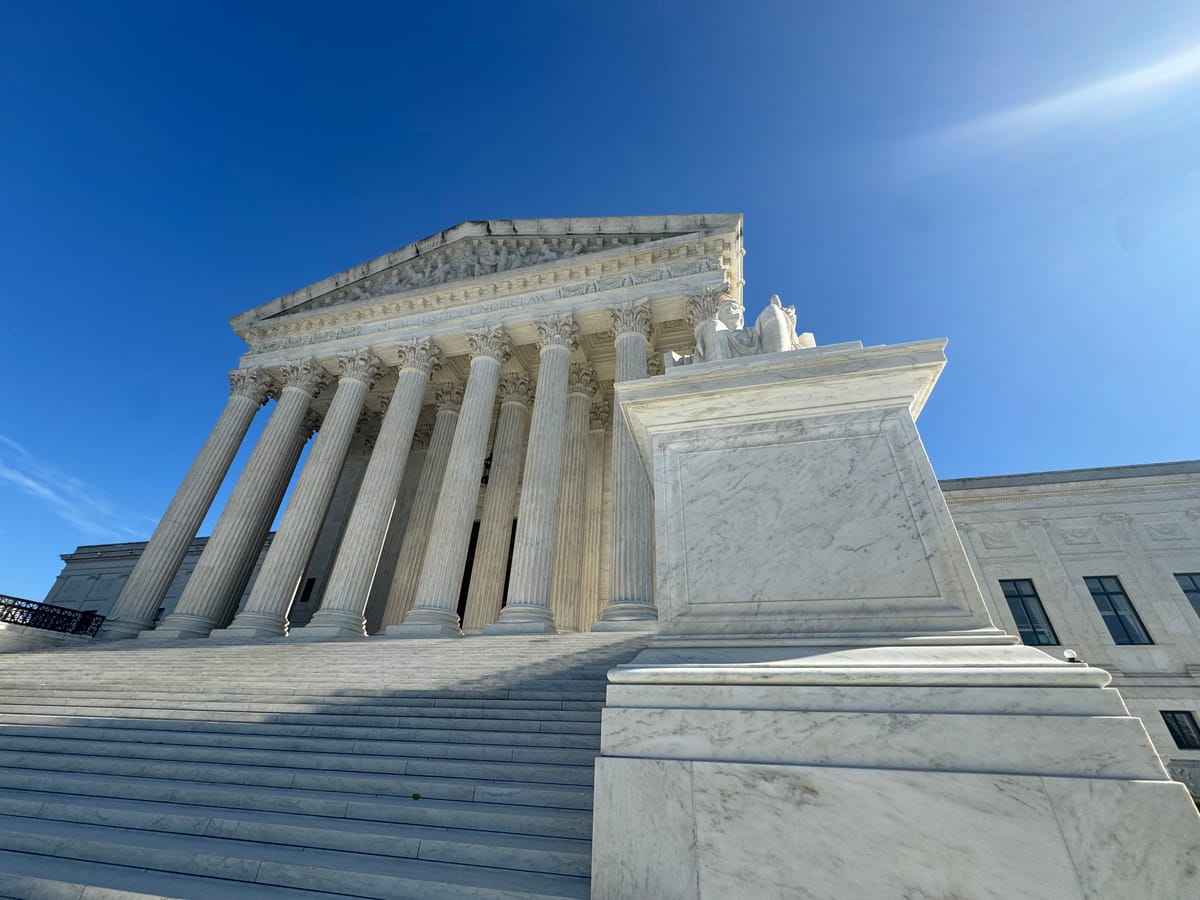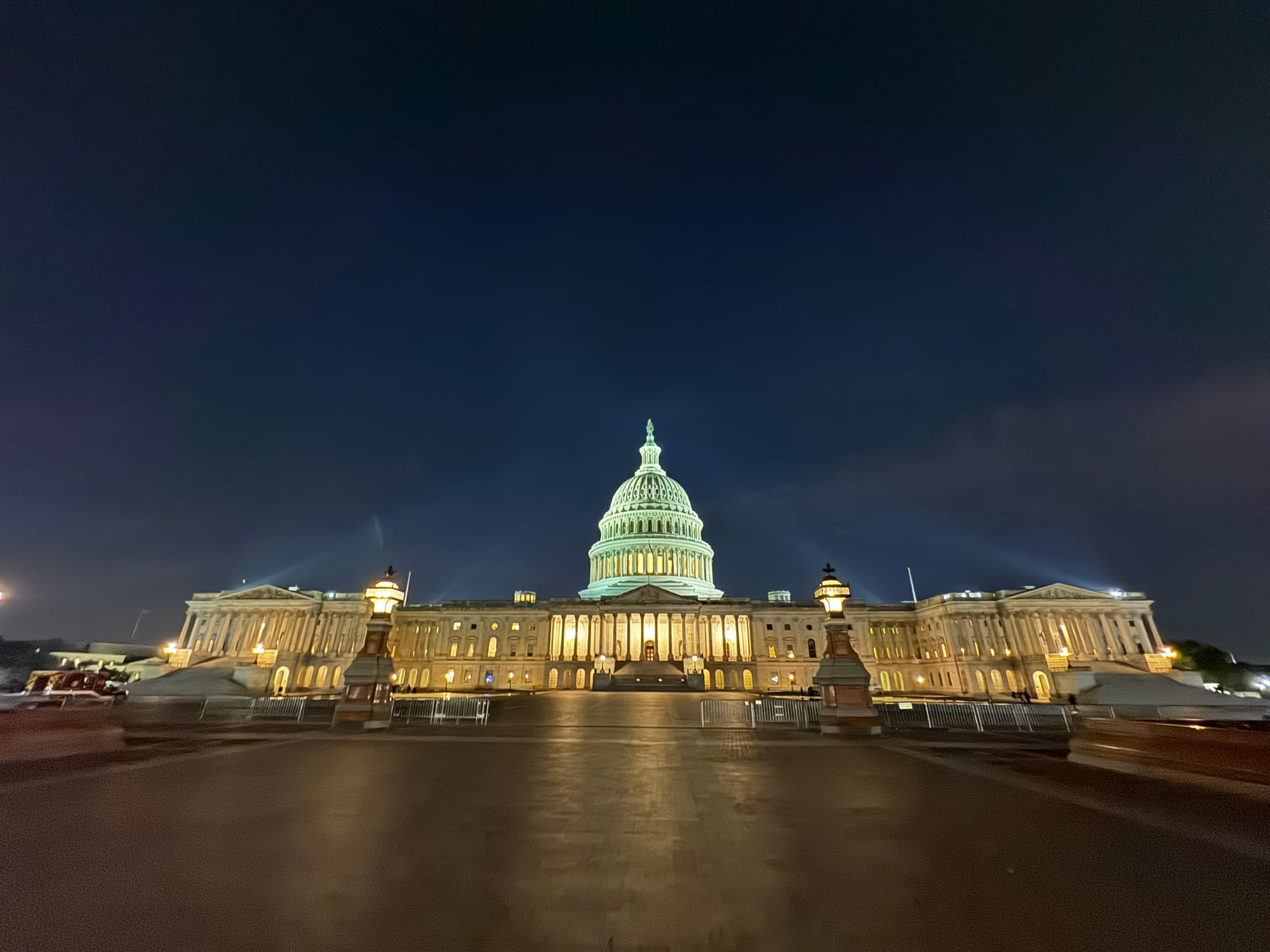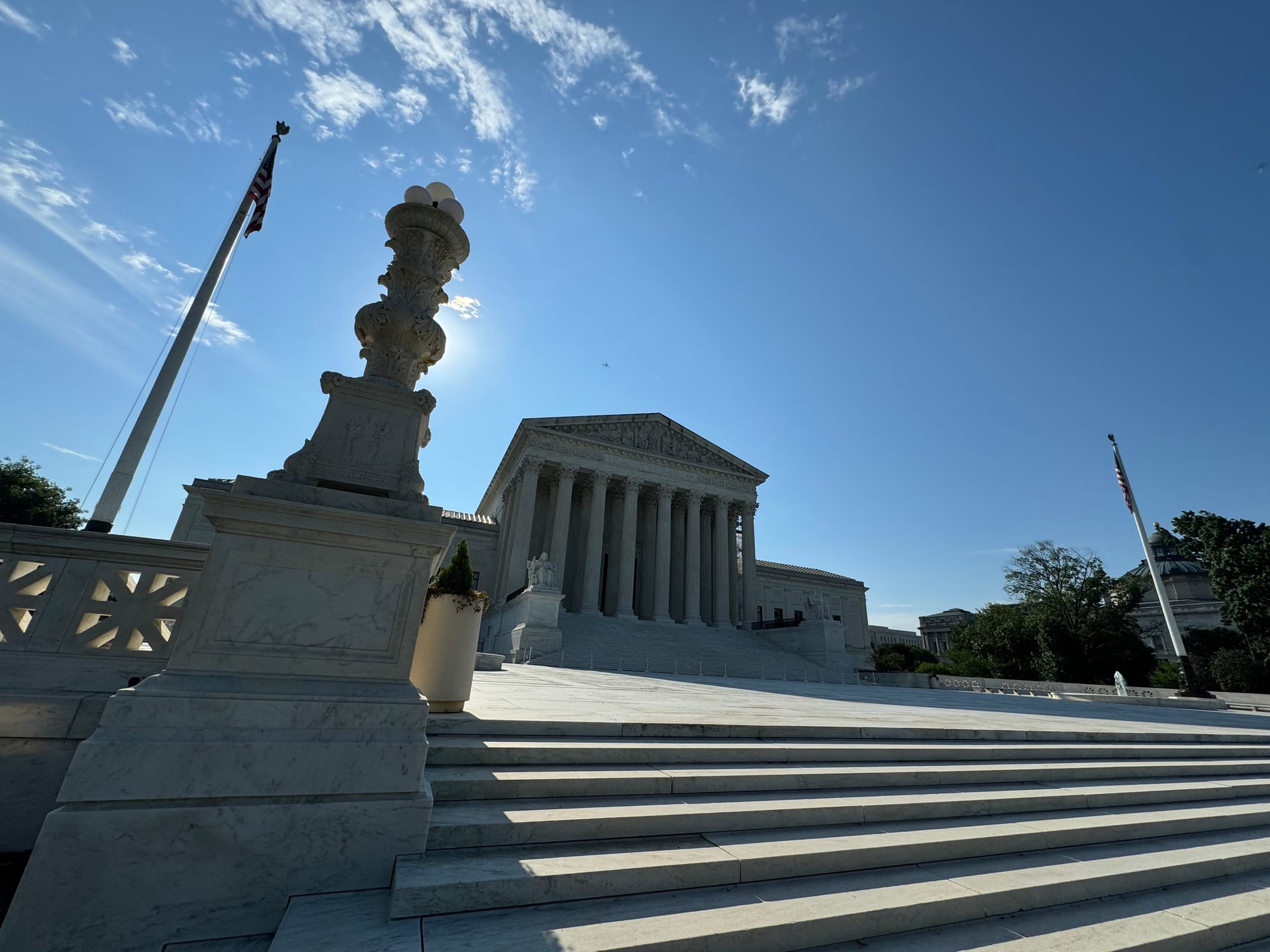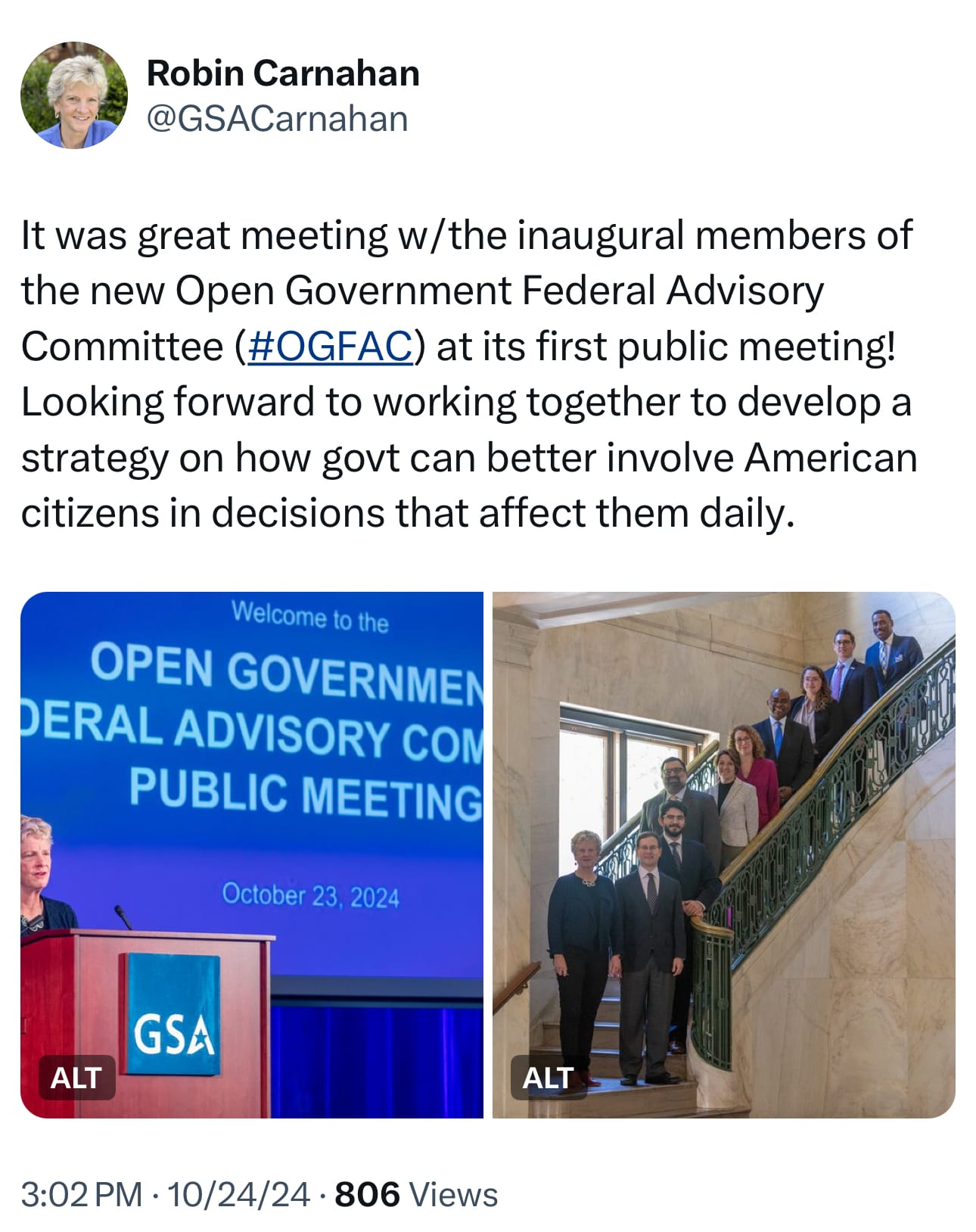The 119th Congress opens to AI, SCOTUS dances around TikTok, and a celebration of the OGFAC

Good evening from Washington, where more snow is inbound later tonight. If you’re receiving this newsletter, it’s because you subscribed to Civic Texts: so glad to see more of you in this new year!
Many thanks to everyone who tuned in, turned on, and kept up in 2024. My analytics say that 50-60% of you consistently are opening each dispatch. Based on my experience sending email newsletters over the past two decades, that's phenomenal and speaks you wanting to hear from me.
If you continue find what I send valuable, insightful, or useful, please share these pieces with your social networks, and consider becoming a paid member, if you're not already – or tell me what I need to do to earn your support at alex@governing.digital.

Opening the House to AI
Last week, the House re-elected Speaker Mike Johnson (D-LA) to lead the House and be second in line for the presidency. CSPAN began broadcasting the session live on cable and the Internet at noon, for those Americans who wanted to watch. In the past, the cameras were not controlled by CSPAN, which meant means this was an evolutionary shift for more transparency.
Every 2 years, January 3rd is like Opening Day for American democracy, complete with kids, siblings, and proud parents present to see the historic moment when their family members became new Members of Congress.
The Senate swore in Members, with Vice President Kamala Harris administering the oath of office in which Senators swear to uphold the Constitution against all enemies, foreign and domestic. Those words will carry increased resonance in the months to come.
But, before the first “pitch” was thrown, the House had to conduct a roll call and then elect a Speaker. After Speaker Johnson was re-elected, then Members could be sworn in, the House could vote on adopting Rules for the 119th, and only then could the House begin public business.
If you had not been paying close attention over the holiday, the reason there’s drama is that the margin for votes is historically thin in the House this year — 219-215, to begin, and then 217-215 until special elections replace the Members Trump who appointed to his administration or resigned.
That’s because the 2024 was not a landslide, contrary to what you might read on X or TruthSocial. Trump won 49.9% of the popular vite and 57% of the Electoral College, neither of which are overwhelming mandates, and had limited coattails in Congress, leading to this historically slim margin and the prospect of odd coalitions.
While the Republican Party won both Houses of Congress and the White House, they don’t have a supermajority in the Senate. One defection or absence in the House will scuttle legislation if Democrats remain united in opposition.
That televised vote was where the drama is, but don’t sleep on how the power that shapes the architecture of participation, legislation, and oversight will be yielded in the Rules.
In 2025, Americans could read the text of the proposed rules online, along with a section-by-section that explains what they mean. If want to wonk out, read Daniel Schuman’s explanation of how rules packages work.
There’s an important nugget in there, too: as adopted in the 119th Congress, these rules will instruct offices, officials, and administrative staff to continue to integrate artificial intelligence into the operations and functions of the US House of Representatives.
If you were reading Civic Texts in 2024, you know the House already adopted an AI policy last fall — but didn’t publish it or a list of permissible use cases, which we know include managing scheduling requests, translation, and transcription services. (I’ve asked staff if they’ll do so.)
That’s low risk stuff. Watch for legislative versioning next, not drafting — though I bet that’s coming – and improvements in constituent services as offices experiment.
The past two decades of opening up Congressional data are going to bear fruit, aided by bipartisan leadership and intentional ideation through the Congressional hackathons.
There's a lot of potentially transformative use cases of AI in the legislative branch. Here's hoping they get much better at disclosing them as they go, so that we can all learn.

Supreme Courts Disaster on Internet Freedom
As Chris Geidner reported in his fantastic legal affairs newsletter (seriously, go subscribe), John Roberts said today that “Congress doesn’t care what’s on TikTok.” To the Supreme Court's immense credit, the oral arguments for TikTok vs Garland were livestreamed today on SupremeCourt.gov, with archived audio (MP3) and a transcript (PDF) already up by day's end, so I could check.
Here's the full quote:
Congress doesn't care about what's on TikTok. They don't care about the expression. That's shown by the remedy. They're not saying TikTok has to stop. They're saying that the Chinese have to stop controlling TikTok. So it's – it's not a direct burden on the expression at all. Congress is fine with the expression. They're not fine with a foreign adversary, as they've determined it is, gathering all this information about the 170 million people who use TikTok.
Either the Chief Justice of the United States did not closely follow the legislative history of a case the Court is considering, or he disregarded public evidence that Congress made a law abridging the freedom of speech and expression of 170 million Americans because they didn’t like what we were seeing or saying there.
(PODCAST: Focusing on TikTok missed the privacy forest for the national security trees.)
Based on what I heard of today’s oral arguments, I expect the Supreme Court to be deferential to the national security arguments of the U.S. government regarding the potential misuse of TikTok and decide to uphold the constitutionality of this law. If so, the Court will codify an ugly precedent set by Congress that President Biden signed into law that will be no doubt cited by authoritarian nations around the globe that merrily filter, ban, and block social platforms where their peoples freely express themselves about human rights abuses.
As with the war in Gaza and human rights, I expect that outcome would further erode the remaining moral authority on Internet freedom that civil servants at the State Department and USAID hold after disclosures that the United States is surveilling the world’s telecom services and declined to check shutdowns by our allies.

More open updates on open government from the OGFAC
On Wednesday, I attended the third public meeting of the U.S. Open Government Federal Advisory Committee (OGFAC), when I heard a thoughtful summary and discussion of the public comments filed in response to the request for information last November regarding the sixth United States National Action Plan for Open Government. You can view the presentation online. Of the 51 received, 47 were able to be posted online at Regulations.gov. 23 of them came from organizations whose work directly involves open government. 1 of them came from me.
If you didn't hear about the public meeting, don't be surprised: unlike the first public meeting, the General Services Administration didn't publish its press release online and promote it, not did this White House engage all Americans about it. As mandated by the Federal Advisory Committee Act, the GSA did publish a public notice on November 12, 2024 announcing the second, third, and fourth public meetings of the OG FAC on December 11, January 8 ,and February 7, 2025. (It's unclear to me how many Americans read the Federal Register every day.) You can find more information about the Federal Advisory Committee & the newish Open Government Secretariat at the GSA online.
This is all an immense improvement on the state of play since 2016. Credit where credit is due to GSA Administrator Carnahan, GSA appointees, and civil servants for chartering this committee under the FACA. Open by default is so much better than opacity by default.
Establishing this committee was the culmination of over a decade of advocacy by organizations and coalitions I helped lead. Its members are still figuring out what they should be doing and how, in a virtuous fashion, albeit far more slowly than I'd hoped.
This OGFAC was necessary to mitigate the imposed opacity for the Biden and Trump White House but is insufficient to bend the arc of governance towards a default to open. there is no substitute for an actively engaged President and an involved Congress for driving the adoption and implementation of policies, programs, and outcomes in our system of government.
That's one reason why the Open Government Partnership has failed as a platform as a result, leaving officials unable to point to any significant positive impact in the United States over the four years when asked.
Unfortunately, I am not optimistic that the inbound administration will embrace government transparency, accountability, participation, or collaboration as a policy or practice, much less be able to lead internationally on anti-corruption, open access, and press freedom.
Instead of the Biden administration‘s decision to substitute existing administration efforts on “equity” for government transparency and accountability, watch for the Trump administration to make digital government commitments, as it did in 2018. (It’s openwashing, either way.)
You’ll be able to watch this week’s public meeting on YouTube in a few days, including my somewhat hot public comment about the artificial constraints on public participation and this White House’s refusal to revise its weak, vague commitments or make new ones that reflect civil society priorities.
The Secretariat's review of recommendations was useful, but spotlighted many technocratic recommendations instead of broader narratives. I suggested the committee think about much more ambitious commitments that aren’t in those responses. The recommendations we heard about were evolutionary, not revolutionary. The next plan needs inspirational grand challenges commensurate with U.S. power and national challenges.
One thing that was notably missing from the presentation the committee heard was the need to address military and intelligence secrecy and over-classification. There’s also both public awareness and anger over corruption and ethics issues in all three branches of government.
I suggested that the committee should use that and recommend enacting an enforceable ethics code for the Supreme Court, a ban on stock trading in Congress, and a rebooted Ethics.gov that combines disclosures and ethics agreements across all three branches of government. As the Office of Government Ethics says, "public service is a public trust, requiring employees to place loyalty to the Constitution, the laws and ethical principles above private gain."



